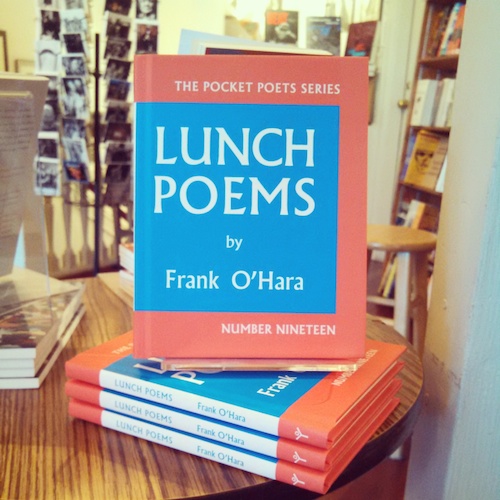Naked 'Lunch': Behind the Scenes of Frank O’Hara’s Lunch Poems

No, I never thot of MEAT SCIENCE ESSAYS in relation to LUNCH POEMS. Comes closer to NAKED LUNCH. But I don’t think anyone will think it’s derivative. Too different....What the hell, so we’ll have to change the name of City Lights to LUNCH COUNTER PRESS.
—Lawrence Ferlinghetti, postcard to Frank O’Hara dated 2/27/64
Number 19 of the City Lights Pocket Poets Series—which had already produced such certifiable classics as Lawrence Ferlinghetti’s Pictures of the Gone World (1955), Allen Ginsberg’s Howl (1956) and Kaddish (1961), and Gregory Corso’s Gasoline (1958)—Lunch Poems (1964) has been continuously in print for 50 years. This is a testament, first of all, the enduring innovation of Frank O’Hara’s poetry, but also secondarily to Lawrence Ferlinghetti’s editorial acumen. Lawrence knew what was up, and indeed was ahead of the curve. With the appearance of Lunch Poems in 1964, he had published three of the most significant queer American poets of the day, for, in addition to Allen Ginsberg’s work, Pocket Poets put out Robert Duncan’s Selected Poems in 1959. And it was in ’59 that Ferlinghetti first asked O’Hara for a book of poems, having recently met the poet and assistant curator at the Modern Museum of Art through Ginsberg on a trip to New York City. The earliest surviving correspondence relating to the project is a postcard from O’Hara dated December 18, 1959, and it’s clear the MS, already referred to as “lunch,” is taking longer than expected to assemble, though he promises he “will send very soon.” A solid five years would pass before Ferlinghetti would have the entire book in hand.
I recently asked Lawrence if he was put out by O’Hara’s procrastination.
“I was in no hurry,” the 95-year-old poet and publisher says. “We were publishing a lot of other books at the same time. It was just one of those things I had on the back burner and whenever it was mature, we’d publish it.”
Here we might note that Lunch Poems caps what is numerically the most fertile period of the Pocket Poets series: 19 volumes between 1955 and 1964. (There would subsequently be an unprecedented three-year pause, before the beginning of the series’ second most-fertile period—21 books in 15 years—inaugurated by Philip Lamantia’s Selected Poems: 1943-1966 (1967).) Between the time Lawrence requested Lunch Poems and the time it was published, seven volumes would be published, from Nicanor Parra’s Anti-Poems (1960) to Allen Ginsberg’s Reality Sandwiches (1963).
“The best publishers and editors did it that way,” Lawrence continues. “They let the work mature and didn’t publish it before it was ready to be published. If I’d pressured Frank to get the MS earlier, I wouldn’t have got such a full MS. It wouldn’t have been as highly developed.”
Even so, such sanguinity has its limits and, in an editorial note to the new 50th Anniversary Edition of Lunch Poems—just published, in gorgeous boards, by City Lights—Lawrence admits to a lost letter “in which I jumped up and down, waving my arms and hollering that I must have ‘Lunch’ or I would starve. (It worked.)”
This 50th Anniversary Edition of Lunch Poems—edited by redoubtable City Lights senior editor Bob Sharrard—should prove to be a revelation, even to longtime O’Hara fans. Much care has gone into it. Quite aside from its inclusion of all the surviving letters and postcards between Ferlinghetti and O’Hara, its editorial note by Ferlinghetti, and its wonderful new preface by O’Hara BFF John Ashbery, this new edition of Lunch Poems restores the book’s original cover color (more of a French blue than the present paperback’s navy) and corrects several linebreaks that were inadvertently altered when the type was reset in the 1980s. It’s the most authoritative edition of Lunch Poems in some 30 years.
It’s easy to imagine the Pocket Poets of the ’50s and ’60s as representing a San Francisco/Beat sensibility, but one of the hallmarks of the series—beginning with volume 2’s translations by Kenneth Rexroth, Thirty Spanish Poems of Love and Exile (1956)—has been a determined internationalism that extends even to the domestic scene. Much as I, as an editor at City Lights, have tried to keep attuned to divers poetry scenes in Los Angeles, Oakland, Milwaukee, Cincinnati, Denver, D.C., and Philadelphia, Ferlinghetti has been alive to the potential for new work, even when coming from a dissident impulse in terrains he knew he knew.
“The main reason I was interested in publishing Frank was because he really represented a distinct voice of New York poets that wasn’t the same as Allen Ginsberg’s,” the Howl publisher says. “There was a certain style that the New York poets developed—I’m thinking of John Ashbery too, for example—that wasn’t like ours at all. It was more like a New York gay style, even though Allen was gay too. I didn’t see it as a departure at all because he was part of the same generation as Allen. It’s just the other side: a representation of New York poetry that wasn’t Allen.”
Garrett Caples is the author of Lovers of Today (2021), Power Ballads (2016), Retrievals (2014), Quintessence...
Read Full Biography

